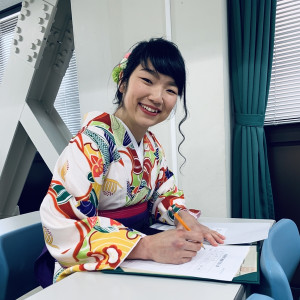If you are interested in knowing the education requirements for a career in Japanese translation, here you will find everything you need to know to work in Canada, from the most recommended degree to some tips to start improving your Japanese! But first, what is a translator?
Translators are professionals who translate written material from one language to another, for example, from English to Japanese or vice versa. In Canada, translators are classified together with other occupations, such as interpreters, who translate oral communication from one language to another, and terminologists, who are responsible for creating, maintaining, and updating glossaries and databases. And finally, sign language interpreters translate the spoken language and vice versa.
Canada's translators, terminologists, and interpreters work mainly for public administration, translation, and interpreting agencies, private companies, international organizations, and the media. But these professionals can also be self-employed.
Some of the typical tasks of translators are converting concepts from one language to another, gathering information in various terminological registers for appropriate translations, speaking and writing fluently in both languages, and conveying style and tone in each language. But then, what do I need to become a Japanese translator? Let's discover this and more below!

What qualifications do you need to be a translator in Canada?
The requirements you will need to get a job as a Japanese translator in Canada are as follows:
- A university degree specializing in translation, interpretation, or terminology in two languages (Japanese and English ) or a university degree in a related discipline such as languages, linguistics, or philology.
- You must also demonstrate two years of experience as a translator in two languages.
- Depending on the type of position you are looking for, translators, terminologists, and interpreters may be required to have a certificate of examination from the Canadian Translators, Terminologists, and Interpreters Council ( CTTIC ).
- And if you are considering working internationally in multinational companies or NGOs, translators or interpreters are usually required to master at least three languages.

But this doesn't end here. Today you must also be equipped with various skills to find your ideal Japanese translation job. Let's discover some of them. For example:
- Analytical skills to collect and analyze information.
- Problem-solving and decision-making skills based on the knowledge extracted from the info gathered.
- Research skills are a person's ability to create new concepts and understandings through data collection.
- Communication skills to participate effectively and proficiently in all spheres of communication.
- Information management competence involves acquiring various skills for searching, filtering, selecting, organizing, and storing information to reaccess it when needed.
- Written expression skills refer to written language production but also contain non-verbal elements.
- Knowledge of CAT tools that refer to computer-assisted translation software that helps translators manage their projects.
What degree do you need to be a Japanese translator?
To become a Japanese translator in Canada, you must get a university degree in translation with specialization, whether in translation, interpretation, or terminology in two languages or a university degree in a related discipline, for example, languages, linguistics, and philology. Also, getting at least two years of experience in translation could be required.
The best programs in translation in Canada are the following:
- York University: Faculty of Liberal Arts and Professional Studies/Department of Languages, Literatures, and Linguistics - Certificate in Japanese.
- McMaster University: Faculty of Humanities/Department of Linguistics and Languages - Bachelor of Arts in Japanese.
- Carleton University: Faculty of Arts and Social Sciences/School of Linguistics and Language Studies - Bachelor of Arts in Japanese.
- Huron University College: Faculty of Arts and Social Science/ Department of French and Asian Studies - Bachelor of Arts in the Japanese language.
- University of Toronto: School of Continuing Studies - Undergraduate studies in Japanese translation.
To contemplate a career in translation, proficiency in spoken and written Japanese will be essential. We recommend that you take courses focusing on grammar and kanji, for example, to begin to be immersed in the Japanese language. For more information, read on!

How much do Japanese translators make in Canada?
The average salary for a Japanese Translator is $57,900 in Canada. However, years of experience can make a big difference. A translator with less than one year of professional experience can expect to earn an annual wage of $41,300. A translator with 1-4 years of experience can make up to $45,200. A translator with 5-9 years of experience can earn an average annual wage of $51,000. A Senior translator with 10-19 years of experience can make up to $57,700. In their late career, employees can make up to $62,900.
Other factors that may affect the average salary of a translator in Canada are:
- The labor market.
- The cost of living depends on the city.
- The type of contract and working hours.
- The productivity and merit of the employee.
- The regulations and agreements that may exist.
Now that you know more about the factors that can impact the salary of a Japanese translator in Canada, we recommend that you do more research on the labor demand in the province where you live.

Do you need to be a certified translator in Canada?
In Canada, provincial and territorial governments fix regulations and laws governing specific occupations. If you want to be called a "translator," you must be registered with one of the provincial regulatory authorities to be authorized to practice as a translator, terminologist, interpreter, or related occupation. And it will be mandatory for you to be certified if you are willing to work in British Columbia, New Brunswick, Ontario, and Quebec.
These regulations are intended to protect the safety of Canadians by ensuring that professionals meet the required standards of practice and competency. So as you can imagine, a non-certified translator won't be able to translate legal documents, such as birth certificates, marriage licenses, immigration applications, academic records, or documents used in court hearings or trials. The translations must be certified whenever a document needs to be submitted to the government or a legal body.
Find out the regulatory bodies of each province in charge of the certification of translators, interpreters, and terminologists:
- New Brunswick:
- Corporation of Translators, Terminologists, and Interpreters of New Brunswick
- Corporation des traducteurs, traductrices, terminologues et interprètes du Nouveau-Brunswick
- Corporation of Translators, Terminologists, and Interpreters of New Brunswick
- Ontario:
- Association of Translators and Interpreters of Ontario
- Québec:
- Ordre des traducteurs, terminologues et interprètes agréés du Québec
Can you be a Japanese translator without a degree?
You may be able to find specific jobs as a translator, but in Canada, the most direct way to gain credibility as a translator is to enroll in a university translation program. As you have already realized, with all the provincial regulations, you must have a university degree to work as a translator and then get certified.
Brush up your skills with Japanese tutoring!
If you want to improve your Japanese, have you considered looking for a Japanese tutor? With a private Japanese tutor, you can develop an excellent foundation in Japanese grammar, vocabulary, and phonetics and obtain a more advanced language level. You could even find native Japanese speakers living in Canada to get familiar with regional expressions, pronunciation, and Japanese slang or prepare yourself better for the Japanese Language Proficiency Test (JLPT). Find the best private teachers worldwide in Superprof!
In the Superprof platform, you will find excellent private lessons to improve any language you have in mind, such as Japanese, French, Mandarin Chinese, Korean, and Russian, among all you can imagine! You can also find classes adapted to your knowledge of the language (N1, N2, N3, N4, and N5) and choose the tutor that best suits what you are looking for.
Find the best Japanese lessons! If you thought that Japanese could be a challenge to learn, at Superprof, you would find the best match to make your path to bilingualism as smooth as possible. Through private tutoring, even the Japanese writing system will be a piece of cake to learn! Get started in Japanese translation!
How does Superprof work? Using the Superprof platform to find your ideal private tutor is very simple!
- Go to the Superprof Canada website and type you want to learn "Japanese."
- Choose "Around me" by typing your location or go for "online lessons."
- You will have access to the best Japanese tutors located in Canada!
- Next, you can add more filters to your search by choosing the class type you are searching for, level (such as Japanese classes for adults), class rate, response time, and if you prefer a native Japanese speaker.
- To choose the perfect tutor, you can check other students' opinions about each and pick the best one.
- And remember to "Book a class!"
- Enjoy your Japanese learning journey, and be ready to conquer the birthplace of manga!
Are you ready to start your path to Japanese expertise? Superprof ファミリーへようこそ!

Summarize with AI:















